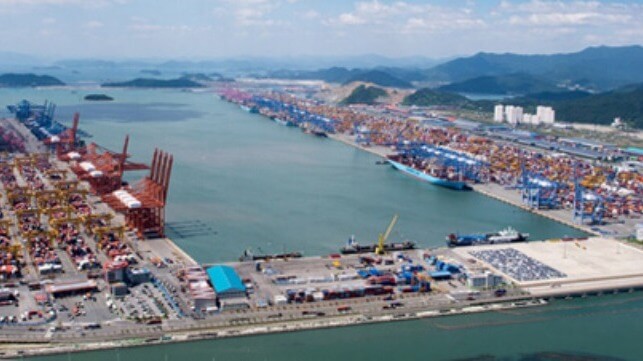Korean Shippers Call for Striking Drivers to Return to Work

Trade associations representing South Korea’s shippers and carriers are calling on the striking truck drivers to return to work as the strike is poised to grow wider and more disruptive as it approaches the two-week mark. The government has strengthened its position saying it will expand its use of back-to-work orders and threats of jail while the Korean union organization has announced plans for nationwide demonstrations on Tuesday, December 6, in support of the striking drivers.
A small portion of Korea’s truckers walked off their jobs on November 24 renewing demands for increased pay and protections under Korean law. The striking union, while smaller in number, is strategic in that it represents drivers that move containers at the ports as well as industries including cement, steel, and petroleum tankers.
The union argues that the government failed to follow through on promises made after an 8-day strike in June 2022. At issue is the pending expiration of the Safe Freight Rate system due to expire at the end of the year. Introduced in 2020 it was designed to ensure minimum rates and work rules for drivers. The union is demanding that the system be made permanent and expanded to more sectors.
The South Korean government is taking a hard line stance against the strike last week ordering the cement truck drivers to return to work and saying this week it would extend the orders to drivers for steel and petroleum products. South Korea president Yoon Suk-yeol called the strikers' actions illegal and said if the government gives in to their demands it would only encourage more illegal strikes and violence. The Yonhap news agency is reporting that the president likened the ongoing truckers strike to North Korea's nuclear threats saying that consistent, intolerance was required to prevent a repetitive cycle and as part of the government’s need to protect the economy.
The Korean Confederation of Trade Unions (KCTU) issued a statement saying it “is furious and sternly warns against the absurd and meaningless words that cannot be believed to have come from the mouth of the president.” The umbrella organization of the country’s unions blamed the president for “driving cargo workers into extreme struggle and ruining the country's economy.”
The trade group contends that the president’s back-to-work orders are illegal and unconstitutional as well as part of a broader effort by the government at promoting labor reform. Citing pending actions by the Fair Trade Commission, the Korean Confederation of Trade Unions says it has decided to hold demonstrations and strike in 15 regions across the country supporting the strike and the broader issues of the right to organize and the right to strike.
The Ministry of Oceans and Fisheries reports that drivers have been sold to return to work. They said on December 4 that just 25 percent of containers were moving normally in the major ports. Only a few of the cement drivers returned to work with most remaining on the picket lines despite the danger the government could revoke their licenses, impose fines, or jail the strikers.
“Due to the refusal of cargo drivers to transport materials, the backlog of cement, steel and petrochemical products, which accounts for 53 percent of the volume transported by coastal shipping, is accumulating, leading to the suspension of shipping operations,” said the Korea Shipping Association, which represents coastal and short sea shipping. “If the strike continues due to the restriction of tanker vehicles entering the refineries, the supply of fuel oil to ships will also be seriously disrupted.”

that matters most
Get the latest maritime news delivered to your inbox daily.
The shipping association was joined by the Korea International Trade Association and the Korea International Freight Forwarders Association calling for the drivers to end the strike. The associations are expressing support for the government’s hard line stance.
The International Labor Organization, however, has also expressed support for the truckers’ strike, raising concerns over the government’s action. In addition to the back-to-work orders, the government had previously said it was prepared to call up the military to drive the trucks but so far has restrained from using the police to break up recent strikes.
